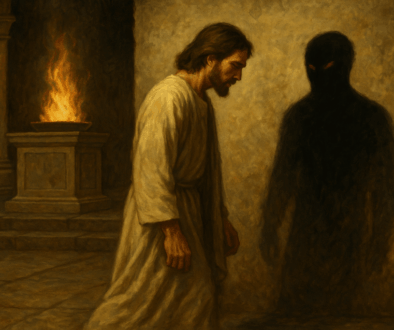The Dangers of the Ideal: When Noble Aspirations Eclipse the Divine
Humanity has always been drawn to lofty visions—noble ideals that beckon us towards unity, purity, progress, and transcendence. These aspirations can indeed spark profound growth, creativity, and a yearning for the divine. Yet, history, Scripture, and psychology remind us that the brighter the ideal, the darker the shadow it can cast. When we pursue ideals for their own sake, we risk supplanting God with human-made abstractions, creating idols out of our grandest hopes. This essay explores how Christians can navigate the tension between aspiring to what is good and succumbing to the illusions that accompany lofty goals.
-
Noble Aspirations, Inevitable Shadows
On the surface, our drive for unity or purity seems deeply virtuous—who would object to a vision of peace or holiness? The problems begin when these ideals assume ultimate status, obscuring God’s grace and our dependence on Him. In that moment, we treat our vision of perfection as though it were the Divine itself, effectively worshipping the ideal.
1.1 The Human Condition and the Lure of Transcendence
From the very start of our biblical narrative, we see how easily humans can slip into this trap. Our desire to excel, to bring order, and to create something meaningful reflects our identity as beings made in God’s image. Yet, in our zeal, we often overlook our limitations. By seeking to transcend these limitations without divine guidance, we subtly displace God from His rightful place and enthrone our own vision of what “should” be.
1.2 The Inevitable Shadow
Carl Jung introduced the concept of the “shadow” as the part of ourselves we deny or repress because it disrupts our carefully crafted self-image. When applied to ideals, the shadow emerges in the pride, fear, and thirst for control that lurk beneath our grand ambitions. The more radiant the ideal, the more blinding it becomes: we press forward, driven by an exalted goal, and neglect the seeds of darkness within our own hearts.
In A Little Book on the Shadow, Robert Bly comments—
“The idealists are shadow-haters. They all end as does Dr. Jekyll, with a monkey-like Mr. Hyde scurrying among back buildings elsewhere in the city.”
By denying our own brokenness, we create the conditions for it to explode into destructive behaviour. In Christian terms, this can turn a well-intentioned pursuit of holiness or service into a stumbling block when the repressed shadow eventually forces its way to the surface.
-
Babel: When Noble Becomes Idol
One of the earliest biblical narratives to address this dynamic is the Tower of Babel (Genesis 11:1–9). At first, the Babel builders appear simply to be seeking unity and significance. They declare, “Come, let us build ourselves a city, with a tower that reaches to the heavens, so that we may make a name for ourselves.” Their aim is not blatantly rebellious. They do not deny God; they merely seek to transcend their human frailty.
Yet in the process, the builders stop acknowledging their dependence on the Creator and begin worshipping their own potential. This subtle shift from honouring God to honouring a human-made tower reveals the shadow: fear of insignificance and pride in self-sufficiency. When divine intervention scatters them, the ideal of unity they cherished shatters into confusion and division. The story serves as a potent lesson: every ideal that fails to keep God at the centre is inevitably corrupted by our pride.
-
The Shadow of the Ideal: Repression and Idolatry
3.1 More than Sinful Nature
In Christian theology, we often speak of a “sinful nature,” but the shadow is not limited to sin alone. It includes our unacknowledged weaknesses, neglected fears, and even repressed strengths that do not fit our self-constructed identity. When we push these parts out of sight, we do not annihilate them; we simply drive them underground.
Over time, this inner split becomes unsustainable. Outwardly, one might appear the “ideal Christian,” fervent in worship and service, yet inwardly harbouring resentment, fear, or unchecked ambition. The longer such contradictions remain buried, the more power they accumulate, manifesting in sudden moral collapse or destructive behaviour.
3.2 Internal Fragmentation vs. Wholeness
Scripture repeatedly calls for a unified heart that seeks God in sincerity:
- “Blessed are the pure in heart, for they will see God” (Matthew 5:8). The word “pure” (Greek katharos) suggests being clean, whole, and undivided.
- “Unite my heart to fear your name” (Psalm 86:11). Here, the psalmist yearns for an integrated heart rather than one torn between competing allegiances.
Repression undermines this unity, fracturing our souls. Instead of embracing the parts of us that need healing and bringing them before God, we hide them. The irony is that such denial leads us into deeper conflict, making the shadow’s eventual emergence all the more devastating.
-
Historical Warnings: When Ideals Become Idols
History provides ample examples of how exalted visions, divorced from divine humility, quickly deteriorate into cruelty and chaos.
4.1 The Crusades: Holy Zeal Tainted by Violence
The Crusades began with the stated purpose of reclaiming the Holy Land and protecting Christian pilgrims. There was genuine fervour and a sense of spiritual duty woven into these campaigns. Yet the ideal of a “holy war” became tainted by brutality, greed, and conquest. Entire cities were sacked, innocents were slaughtered, and even fellow Christians were attacked, as seen in the sacking of Constantinople (1204). Here, the shadow took the form of arrogance and intolerance, overshadowing the Crusaders’ initial devotion.
4.2 The Puritans and the Salem Witch Trials: The Pursuit of Purity
The Puritans sought to build a society that mirrored divine holiness. In Salem, this rigorous quest for purity devolved into paranoia and scapegoating, culminating in the executions of supposed “witches.” Their unwavering commitment to purity left no room for the graceful acknowledgement of human brokenness, resulting in a culture of fear and accusation.
4.3 The Prosperity Gospel: The Shadow of Material Blessing
In modern times, certain expressions of the Prosperity Gospel emphasise wealth and health as signs of God’s favour. The biblical promise of divine blessing is there, yet the movement can slip into materialism when the ideal of prosperity eclipses reliance on God’s grace. Faith becomes transactional, and disappointment abounds for those who do not see the promised riches. This shadow emerges in the form of greed, false hope, and a fundamental misunderstanding of God’s true blessings.
These historical and contemporary examples underline the risk that lofty visions, even those rooted in Scripture, carry with them. Friedrich Nietzsche famously wrote in Thus Spoke Zarathustra—
“Madmen they all seem to me, and clambering apes, and too eager… badly they all smell to me, these idolaters.”
For Nietzsche, it was precisely the overzealous nature of human “idealism” that reeked of artifice and self-deception. Whenever an ideal is exalted above honest humility, the line between devotion and idolatry becomes perilously thin.
-
Biblical Counters to Idealism
Scripture offers a radically different model of pursuing greatness, one founded on humility and an unwavering trust in God. Rather than glorifying human triumphs or moral perfection, the Bible upholds the paradoxical truth that genuine strength emerges from acknowledged weakness.
5.1 Jesus and the Pharisees: Confronting Religious Perfectionism
No group in the New Testament exemplifies the pitfalls of idealism better than the Pharisees. They genuinely sought holiness through strict obedience to the Law, yet Jesus repeatedly highlighted their obsession with external purity at the expense of mercy and inward honesty.
“Woe to you, teachers of the law and Pharisees, you hypocrites! You clean the outside of the cup and dish, but inside they are full of greed and self-indulgence” —Matthew 23:25
Here, Christ is not dismissing holiness or discipline. Rather, He is calling out a distorted form of devotion that suppresses human frailty instead of surrendering it to God.
5.2 Paul’s Weakness and Divine Strength
The Apostle Paul provides one of the most transparent accounts of wrestling with human limitation:
“For I do not do the good I want to do, but the evil I do not want to do—this I keep on doing” —Romans 7:19
Paul lays bare his own divided nature, acknowledging the tension between his desire to serve God and the darker impulses he cannot simply will away.
Yet Paul’s admission leads not to despair, but to a profound dependence on grace:
“My grace is sufficient for you, for my power is made perfect in weakness” —2 Corinthians 12:9
Instead of repressing his shadow, Paul confesses it, allowing God’s power to shine through his shortcomings.
-
Towards Wholeness: A Roadmap for Navigating the Ideal
The question for Christians is not whether we should aspire to greatness, holiness, or unity; Scripture encourages us to “press on toward the goal” (Philippians 3:14). Rather, we must discern how to pursue these ambitions without allowing them to morph into idols.
6.1 See Your Shadow
- Honest Self-Examination: Begin by acknowledging that every ideal holds the potential for pride, fear, or a craving for control. This is not a call to abandon noble aims but to recognise their pitfalls.
- Prayerful Reflection: The Psalmist’s plea, “Search me, God, and know my heart; test me and know my anxious thoughts” (Psalm 139:23–24), serves as a reminder that only God can truly uncover our hidden motives.
6.2 Surrender the Ideal
- Hold Ideals Loosely: Our grand visions must be submitted to God’s sovereignty. This does not dilute our passion; it realigns it under the higher authority of the Creator.
- Remember God’s Providence: “In their hearts humans plan their course, but the Lord establishes their steps” (Proverbs 16:9). Trusting in divine orchestration prevents us from idolising our own plans.
6.3 Ground Yourself in Grace
- Perfection Is Not the Goal: The Christian life is not about flawless performance but about deepening our relationship with God, who meets us in our weakness.
- No Condemnation: “There is now no condemnation for those who are in Christ Jesus” (Romans 8:1). Grace frees us from the crushing burden of idealism gone awry and allows us to approach God in honest vulnerability.
6.4 Pursue God, Not the Ideal
- Worship the Giver, Not the Gift: Ideals can become idolatrous when we elevate them above the One who inspired them. Keep God at the centre, allowing every aspiration to flow from your love for Him rather than a need to prove your worth.
- Guard Your Focus: The very first commandment, “You shall have no other gods before me” (Exodus 20:3), calls us to undivided devotion. Any vision that takes precedence over God’s reality endangers our spiritual integrity.
-
Conclusion: The Noble and the Shadow
Aspirations towards purity, unity, and progress reflect the image of God within us. Indeed, we are called to be co-creators and agents of His kingdom. However, when these aspirations eclipse the Divine Himself, they become idols—demanding more devotion than they deserve and inevitably warping our souls.
The Tower of Babel epitomises the moment when the noble slips into idolatry: a shared vision morphs into a bid for self-glorification. History echoes this pattern, revealing how easily our grand pursuits can deteriorate into cruelty or hypocrisy once the shadow takes control. Yet Scripture does not leave us without hope. Through Jesus’ indictment of the Pharisees, Paul’s confession of weakness, and the call to an undivided heart, we see a better way.
The path forward begins with a humble confession that we are not self-sufficient: our finest virtues and grandest designs still need God’s light to purify them. By seeing our shadow, surrendering our ideals, grounding ourselves in grace, and keeping our gaze on the living God, we can embrace noble aspirations without letting them devour us.
Ultimately, the question is not whether we will strive for something higher—we all yearn for that. It is whether we will let God lift us there in His grace, rather than attempting to ascend by our own frail contrivances. In Him, we find the perfect balance: a call to greatness tempered by humility, and a pursuit of holiness anchored in the unshakable reality of divine love.
When our ideals serve the God who transcends all human vision, we discover the true fulfilment of our deepest longings—and safeguard ourselves from the idolatry that so readily ensnares.
Psycheverse – “No other gods, only me.” – Exodus 20:3 (MSG)



